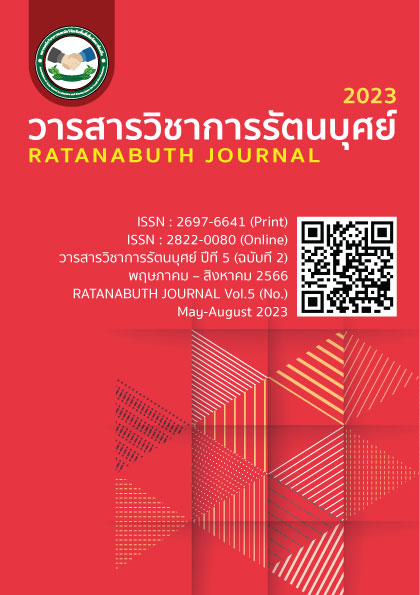Strategic Factor Development Management that Affects Being a Learning Organization of the Local Government Organization Strategic Factor Development Management that Affects Being a Learning Organization of the Local Government Organization
Main Article Content
Abstract
Local government organizations need to adjust their strategies to facilitate knowledge transfer within and outside the organization. The key objective is to establish the best practices for efficient work performance. The purpose of this research is to study the factors that influence the strategic management of local government organizations as learning organizations. It aims to investigate the factors that affect the organization's learning capability and to create and validate a model for the organization as a learning organization within the local government authorities in the Northeastern Region of Thailand. The population and sample groups include 324 individuals consisting of administrators and staff working in local government organizations. The study will utilize the Yamane formula and employ stratified random sampling. The tools used will include a questionnaire with a confidence level ranging from .711 to .875. The statistical techniques employed will include mean, standard deviation, and multiple regression analysis.
The research findings indicate that the overall average of strategic management factors influencing the organization as a learning organization for local government organizations is ( = 3.28). The predictive factors for the organization as a learning organization can be summarized into eight dimensions, namely: participation in management, vision, teamwork, strategy, knowledge management, commitment, personnel development, and technology. The respective regression coefficients (ß) for these dimensions are .246, .327, .120, .147, .113, .102, .118, and -.120. The prediction rate is 74.5% in order of magnitude. The model of the local government organization as a learning organization in the Northeastern Region emphasizes the importance of utilizing information technology as a key tool for management. It also highlights the significance of teamwork to elevate the organization's status as a recognized learning organization. Furthermore, it stresses the necessity of developing essential skills and knowledge for personnel in utilizing technology for knowledge management. Importantly, the active involvement of personnel within the organization is crucial in driving the advancement of the organization as a learning organization model.
Article Details

This work is licensed under a Creative Commons Attribution-NonCommercial-NoDerivatives 4.0 International License.
References
กนกอร สมปราชญ์. (2560). ภาวะผู้นำและภาวะผู้นำการเรียนรู้สำหรับผู้บริหารสถานศึกษา. ภาควิชาการบริหารการศึกษาคณะศึกษาศาสตร์. พิมพ์ครั้งที่ 2. มหาวิทยาลัยขอนแก่น.
ขวัญรุ่ง อยู่ใจเย็น. (2556). สมรรถนะของผู้บริหารสถานศึกษาที่ส่งผลต่อการเป็นองค์กรแห่งการเรียนรู้ของสถานศึกษาในจังหวัดเพชรบุรี สังกัดสำนักงานเขตพื้นที่การศึกษามัธยมศึกษา เขต 10. วิทยานิพนธ์ครุศาสตรมหาบัณฑิต. มหาวิทยาลัยราชภัฏเพชรบุรี.
จินตนา บุญบงการ. (2559). จริยธรรมในวิชาชีพนักธุรกิจ. นครปฐม : สำนักพิมพ์มหาวิทยาลัยมหิดล.
ไชยสิทธิ์ ปิยมาตย์. (2556). ปัจจัยที่ส่งผลต่อการเป็นองค์การแห่งการเรียนรู้ของโรงเรียนเหล่าสายวิทยาการของกองทัพบก. ดุษฎีนิพนธ์ปริญญาการบริหารการศึกษา. กรุงเทพฯ: มหาวิทยาลัยศรีปทุม.
ณัฏฐพันธ์ เขจรนันท์ และจินตนา บุญบงการ. (2548). การจัดการเชิงกลยุทธ์. กรุงเทพฯ:ซีเอ็ดยูเคชัน.
ธีระ รุญเจริญ. (2553). ความเป็นมืออาชีพในการจัดและบริหารการศึกษา ยุคปฏิรูปการศึกษาเพื่อปฏิรูปรอบ 2 และประเมินภายนอกรอบ 3. ขอนแก่น: สำนักพิมพ์ข้าวฟ่าง.
เปรมศิริ เนื้อเย็น. (2556). ปัจจัยที่ส่งผลต่อการเป็นองค์กรแห่งการเรียนรู้ของสถานศึกษา สังกัดสำนักงานเขตพื้นที่การศึกษาประถมศึกษาเพชรบุรี เขต 2. วิทยานิพนธ์ปริญญามหาบัณฑิต. เพชรบุรี : มหาวิทยาลัยราชภัฏเพชรบุรี.
พรชัย เจดามาน. (2560). ภาวะผู้นาการเปลี่ยนแปลง ศตวรรษที่21 : ไทยแลนด์4.0. (ออนไลน์).สืบค้นจากhttps://www.kroobannok.com/83312.
แพนศรีศรีจันทึก. (2554). ปัจจัยที่ส่งผลต่อการเป็นองค์กรแห่งการเรียนรู้ของบุคลากรสายสนับสนุนกรณีศึกษามหาวิทยาลัยเทคโนโลยีราชมงคลอีสาน. วิทยานิพนธ์ปริญญาบริหารธุรกิจมหาบัณฑิต. ขอนแก่น : มหาวิทยาลัยเทคโนโลยีราชมงคลอีสาน.
รูสนานี ยาโม. (2556). ปัจจัยการบริหารที่ส่งผลต่อสภาพการเป็นองค์การแห่งการเรียนรู้ของสถานศึกษาในสามจังหวัดชายแดนภาคใต้. วิทยานิพนธ์ปริญญาครุศาสตรมหาบัณฑิตสาขาการบริหารการศึกษา. สงขลา : มหาวิทยาลัยสงขลานครินทร์.
วรรณะ บุษบา. (2553). การศึกษาปัจจัยที่ส่งผลต่อการเป็นองค์กรแห่งการเรียนรู้ของสถานศึกษา สังกัดสำนักงานคณะกรรมการการศึกษาขั้นพื้นฐาน. วิทยานิพนธ์ปรัชญาดุษฎีบัณฑิต. กรุงเทพฯ : มหาวิทยาลัยสยาม.
วรรณะ บุษบา. (2553). ปัจจัยที่ส่งผลต่อการเป็นองค์กรแห่งการเรียนรู้ของสถานศึกษา สังกัดสำนักงานคณะกรรมการการศึกษาขั้นพื้นฐาน. วิทยานิพนธ์ปริญญาปรัชญาดุษฎีบัณฑิต. กรุงเทพ: มหาวิทยาลัยสยาม.
ศศกร ไชยคำหาญ. (2550). ปัจจัยทีมีอิทธิพลต่อการเป็นองค์การแห่งการเรียนรู้ของสถานศึกษาขั้นพื้นฐาน.ดุษฎีนิพนธ์ปรัชญาดุษฎีบัณฑิต. กรุงเทพฯ : มหาวิทยาลัยศิลปากร.
สะกี้หน๊ะ หลีแอ. (2555). ปัจจัยที่ส่งผลต่อความเป็นองค์การแห่งการเรียนรู้ในโรงเรียนเอกชนสอนศาสนาอิสลาม จังหวัดสงขลา. วิทยานิพนธ์การศึกษามหาบัณฑิต. สงขลา : มหาวิทยาลัยทักษิณ.
สำนักงานเลขาธิการสภาการศึกษา. (2561). สภาวะการศึกษาไทยปี 2559/2560 แนวทางการปฏิรูปการศึกษาไทยเพื่อก้าวสู่ยุค Thailand 4.0. กรุงเทพฯ : สำนักงานเลขาธิการสภาการศึกษา.
Garvin, D.A., Edmondson, A.C. and Gino, F. (2008). Is Yours a Learning Organization? Harvard Business Review, pp.109-115.
Hoy, W. K. & Miskel, C.G. (2001). Educational administration: Theory, research, and practice. (6 th ed), Boston: McGraw - Hall.
Lunenburg, F.C. and Ornstein, A. C. (2004). Educational Administration Concepts and. Practices. Newyork: Thomson Learning, Inc.
Marquardt, M. J. and Reynolds, A. (1994). The Global Learning Organization. New York : IRWIN.
Marquardt, M.J. (1996). Building the Learning Organization : A Systems Approach to. Quantum Improvement and Global Success.New York : McGraw-Hill.
Stanage, Kenneth Jon. (1996). Using Technology to Create a Learning Organization (Leadership). from Pro Quest File : Dissertation Abstract Item 9629070.
Taro Yamane. (1973). Statistics: An Introductory Analysis. 3rdEd. New York. Harper and Row.


